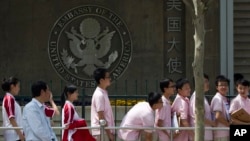Student Union
Neuroscientist Leaves Rich Legacy for Students From Diverse Backgrounds

A Pakistani neuroscientist who came to the U.S. as an international student has died at 43, leaving behind a movement of support for diverse and nontraditional young scientists.
"My campaign will provide awards to young scientists from backgrounds that are diverse, under-resourced, marginalized or traditionally under-represented in psychological and neural sciences," Nadia Chaudhri wrote in May, when she started a GoFundMe page to help students pay to attend the annual conference for the Research Society on Alcoholism.
"I am targeting funds to these groups to provide a specific leg up to young scientists who may face hardship due to systemic issues like racism, sexism and other forms of prejudice," she wrote.
Born in Karachi, Chaudhri came to the U.S. in 1985 to attend Franklin & Marshall College in Pennsylvania as an international student. Her full scholarship covered the yearly $31,000 tuition, room and board, according to a news article from Concordia University, where she was a full professor.
"I became fascinated by the interaction between brain and behaviour, specifically in relation to drug addiction," she wrote on her GoFundMe page.
She went on to earn a doctorate in neuroscience at the University of Pittsburgh, focusing on the effect of social cues on cigarette smoking. She moved to California in 2005 for a postdoctoral fellowship at the University of California-San Francisco, and joined Concordia University in Montreal, Quebec, in 2010 as faculty and to establish a research laboratory.
"Throughout my academic training in the United States I faced funding challenges because I was not a U.S. citizen. Luckily, a handful of scientific organizations supported students regardless of their immigration status," she wrote.
"I benefited from travel awards from scientific societies. These monetary awards allowed me to attend important conferences in my field, where I presented my research and became part of a vast and generous network of researchers who shaped my career," she wrote.
Through Concordia University, Chaudhri also established the Nadia Chaudhri Wingspan Award, "an annual scholarship to support the training of neuroscientists from underrepresented backgrounds," according to a university webpage.
She kept an active Twitter account, @DrNadiaChaudhri, documenting her progress in her fight against advanced ovarian cancer. She promoted Concordia through the Concordia Shuffle, in which she pledged to walk the length of the palliative care ward "every day for as long as I can." Palliative care offers end-of-life care for patients.
"Nadia was a force of nature. She was an incredibly talented researcher with a passion for teaching and student success matched only by her commitment to diversity, equity and inclusion," Concordia President Graham Carr said on the university's website.
"I firmly believe that progress in science needs diversity in the voices and faces that are tackling scientific questions," Chaudhri wrote on her fundraising page. "To achieve this diversity, we must elevate young people who might be overlooked because they don't fit a particular mold."
She said she was one of those students who, because of gender, color or culture, faced challenges outside her scientific capabilities.
"When I gave talks or presentations, people often commented on my accent instead of my science," Chaudhri said in an interview in May. "When I pierced my nose, something I did to celebrate being Pakistani, a senior female faculty member told me that the piercing would prevent me from getting a faculty position."
Chaudhri died on October 5 of ovarian cancer. Her GoFundMe has raised more than $216,000 to date.
See all News Updates of the Day
- By VOA News
International students discuss US campus culture shock

International students at De Anza College in Cupertino, California, talked about culture shock in an article in La Voz News, the student newspaper.
"It felt like a major culture shock. Everything was so different, from academics to mannerism," said a student from Mexico.
Read the full story here.
These are the most expensive schools in the US
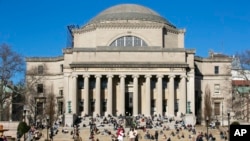
High tuition costs along with housing and food expenses can add up for students at U.S. colleges and universities.
MSNBC looked at the most expensive schools in the country, with one costing more than $500,000 for a bachelor’s degree. (June 2024)
Uzbekistan students admitted into top US universities
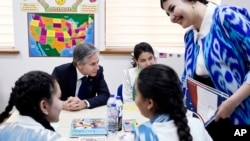
Students from Uzbekistan are among the international students admitted to top colleges and universities in recent years.
Gazata.uz profiled some of the Uzbekistan students attending Harvard, Brown, Princeton and other U.S. universities. (June 2024)
- By Stella Hsu
Reports of visa checks, deportations worry Chinese STEM students in US
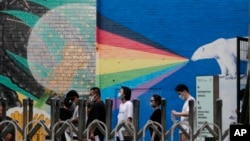
Geopolitical tensions and growing competition in tech between the United States and China appear to be spilling over into academia despite commitments from the world’s two biggest economies to boost people-to-people exchanges.
The United States remains the top choice for Chinese students seeking to study abroad with nearly 300,000 studying in American colleges and universities during the 2022-2023 school year. But reports of some cases that students and professors are facing extra scrutiny while passing through immigration and the deportation of others are raising concerns.
For Chen Xiaojin, a doctoral student studying semiconductor materials at a university in the Washington, D.C., metropolitan area, it has been six years since she returned to her hometown of Beijing.
At first, it was the COVID-19 pandemic that kept her from going home. But over the past two years, she has been deterred by accounts of Chinese students majoring in science and engineering being required to reapply for their visas upon returning to China.
She also says she is worried by reports over the past six months of Chinese students being deported, even at nearby Dulles Airport.
"My current research is relatively sensitive, and my boss [adviser] is getting funds from the U.S. Department of Defense, making it even more sensitive,” she told VOA. "I am afraid that I won't be able to return after I go back [to China]."
Chen says that if she did return to China, she would have to apply for a new visa.
In a report late last month, Bloomberg said it had found at least 20 Chinese students and scholars with valid visas who were deported at U.S. Customs since November and barred from reentry. The U.S. Customs and Border Protection Agency does not release relevant data.
Immigration attorney Dan Berger represented one Chinese student who was deported late last year. He tells VOA Mandarin that the student studied biological sciences at Yale University and was about to complete her doctorate.
She visited her family in China and got a new visa but was deported by customs at Dulles Airport and barred from reentering the country for five years. Berger said he did not see anything suspicious in the transcript of the conversation between the student and the customs officer.
"We have seen what seems like a pattern over the last six months of Chinese PhD students being turned around…. more than I've seen in quite a while," he said.
Matthew Brazil, a fellow at the Jamestown Foundation, said neither country seems willing to explain the situation. However, he believes that in most cases, the United States must have valid reasons for blocking visa holders from entering the country.
In some cases, the student’s background may not match what is written on the visa application. In other cases, customs agents may also find something that the State Department missed, and once they see it, they are responsible for taking action.
"I wish the Chinese side would be specific about their students who were refused entry,” he said. “The fact that both sides are mum on details and that the Chinese side is engaged with the usual angry rhetoric means that each has security concerns. And that says to me that there was good reason for the U.S. to stop these particular applicants."
Brazil also sees a connection between the entry denials and export control regulations issued by the United States in October 2022 that restrict China's ability to obtain advanced computing chips, develop and maintain supercomputers, and manufacture advanced semiconductors.
U.S. Customs and Border Protection is one of the law enforcement agencies authorized to investigate violations of export control regulations, he said.
"Beijing's intelligence agencies are known to focus attention on PRC [People's Republic of China] students and scientists headed abroad who study or work on dual-use technologies controlled under the Export Administration Act — compelling Chinese students and scientists to report on what they've learned when they return to China on holiday,” he said. “This has been true for decades."
Bill Drexel, a fellow for the Technology and National Security Program at the Center for a New American Security, said the U.S. government did find some cases where students tried to steal strategic technology for China.
"I think it would both not be surprising that they found some really questionable or incriminating evidence for some students,” he said. “It would also not be surprising if, in their hunt for really solid evidence, they also may have made some mistakes on other students.”
Drexel adds that “it’s just kind of an unfortunate fact of the time that we live in and the tactics that the CCP uses when it comes to these measures."
In a post on X in early May, U.S. ambassador to China Nicholas Burns tried to dispel concerns about visas and entry to the United States for students and scholars. In the post, he said "99.9% of Chinese students holding visas encounter no issues upon entering the United States.”
In an interview with The Wall Street Journal Monday, Burns said it is China that is making it impossible to promote people-to-people ties. Burns told the Journal that students attending events sponsored by the United States in China have been interrogated and intimidated.
He also said that since U.S. President Joe Biden and China’s leader Xi Jinping held their summit in San Francisco last year, China’s Ministry of State Security and other agencies had interfered with Chinese citizens’ participation at some 61 events.
At a regular briefing on Wednesday, Chinese Foreign Ministry spokesperson Mao Ning dismissed those accusations, saying that they did not “reflect reality" and that went against key understandings reached by both countries’ presidents in San Francisco.
“The United States, under the pretext of 'national security,' unjustifiably harasses, interrogates, and deports Chinese students in the U.S., causing them significant harm and creating a severe chilling effect,” Mao said. “The image of the United States in the minds of the Chinese people fundamentally depends on the actions of the United States itself.”
Drexel said he believes Burns’ comments about visas and students' willingness to study in the U.S. still ring true.
“On balance, it's still the case that American universities are overwhelmingly warm towards Chinese students and want them in large numbers," he said.
However, Berger, the immigration lawyer, is concerned about the chilling effect recent cases involving Chinese students could have.
"In general, we are being more careful about advising Chinese graduate students in STEM fields about traveling and letting them know that there is some small risk,” he said.
Even though the risk is small, it does seem to be real at the moment, he said.
Adrianna Zhang contributed to this report.
US federal judge blocks new regulation targeting for-profit colleges
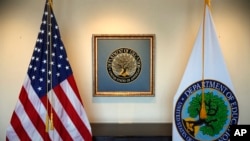
A federal judge in Texas has blocked a regulatory provision targeting for-profit colleges that was scheduled to take effect in July 2024.
Times Higher Education reports that the rule, which would affect student loans, was challenged by for-profit institutions. (June 2024)





